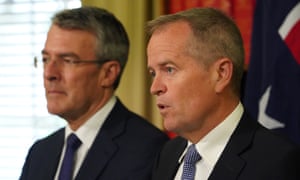Extract from The Guardian
Bill Shorten to work with crossbench in bid to force establishment of a national integrity commission
Labor is attempting to use the government’s new minority status
against it, by calling on the crossbench to support the latest push for a
federal anti-corruption body.
But even with the entire crossbench, including incoming Wentworth independent Kerryn Phelps, Labor remains one vote short of being able to force opposition legislation through the House.
The loss of Wentworth left the government with 75 seats in the House, with one vote tied to the Speaker. Labor and the crossbench can combine to create 75 votes but still fall one short of creating an absolute majority needed to pass legislation.
But that won’t stop Labor from attempting to wedge the government, with Bill Shorten
announcing his party would work with the crossbench in an attempt to
force the establishment of a national integrity commission, similar to
the New South Wales corruption watchdog, Icac.But even with the entire crossbench, including incoming Wentworth independent Kerryn Phelps, Labor remains one vote short of being able to force opposition legislation through the House.
The loss of Wentworth left the government with 75 seats in the House, with one vote tied to the Speaker. Labor and the crossbench can combine to create 75 votes but still fall one short of creating an absolute majority needed to pass legislation.
“I want to make it clear that when parliament resumes at the end of November, we will be seeking the support of the crossbench to help develop a national anti-corruption commission,” Shorten said on Monday.
“We will work with the Coalition government, we will work with the Liberals, but we won’t wait for them.”
Labor pledged to establish a federal anti-corruption body in January this year to “resolve the gaps and inconsistencies in the current framework and be designed to ensure the highest standards in public administration”.
Several crossbenchers have moved to support the idea, with the Greens MP Adam Bandt having advocated for a similar body in the past.
The crossbench has already made moves to establish a federal integrity commission, signalling legislation would be forthcoming in the last parliament sitting of the year.
It wants any federal body to have wide-ranging powers that would encompass not only the political sphere but lobbyists, agencies and private contractors that deal with government and government contracts, as well as whistleblower protection.
Bandt is in support, as is Cathy McGowan, Rebekha Sharkie and Andrew Wilkie. Bob Katter has previously said he would be in favour of a body, depending on what the final proposal looked like. But in a statement to Guardian Australia, Katter now said he would be “sitting on the fence on this one until the last minute”, as he believed it could be a “two-edged sword”. Phelps is in favour of such a body.
The idea has also been viewed favourably by some Nationals MPs, who proved instrumental in forcing the government to establish a royal commission into the banking industry.
Labor has not given detail on what it would expect the national integrity commission to look like. In May, the attorney general, Christian Porter, said he would look at any potential framework to see what would be workable.
On Monday morning, when asked about the letter Shorten wrote to Scott Morrison calling for his support in instigating a national commission, the defence minister, Christopher Pyne, said he did not believe one was necessary.
“Look, we have a number of different bodies which are already over-sighting federal politicians,” Pyne told Sky News. “The new Independent Parliamentary Expenses Authority, of course the Australian federal police, which has its own particular division which deals with fraud and so on in public office.
“It’s the easiest thing to do is call for another organisation costing money, giving it extra powers.
“I don’t think that’s necessary at the national level and it’s just another way of Bill Shorten trying to distract people from the real issues that matter around jobs, the economy, national security, border protection.”
But Labor is attempting to force the government into supporting the idea by linking it to the banking royal commission, which Morrison, as treasurer, initially opposed.
“[Scott] Morrison, the current Liberal prime minister, voted 26 times to stop the banking royal commission,” Shorten said. “On this issue of a national anti-corruption commission, I ask Mr Morrison to drop his trademark stubbornness and work with all sides of politics.
“The Australian people want us to do it and, if the government is not prepared to do this, when parliament resumes next week Labor will seek to work with the crossbenchers to develop a national anti-corruption commission.
“And of course I believe, and I understand, that there are government backbenchers who would support a national anti-corruption commission, and I think that the parliament should express the will of the Australian people on this matter as soon as possible.”


No comments:
Post a Comment